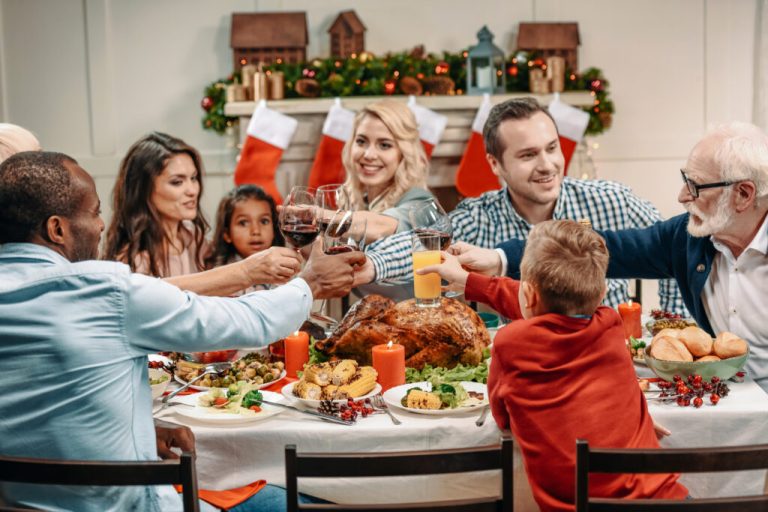Eight in ten Americans say the expectations and events surrounding the holidays leave them feeling increased stress, with 31.1% admitting that their physical and mental health definitely deteriorated in the last quarter of the year.
Many people are afraid to go home for the holidays. It can be a stressful time to tiptoe around divided family members, try to keep the peace, and maintain some personal space.
The American Institute of Stress claims that a score of 150 to 300 on the Holmes-Rahe Stress Inventory equates to a 50% chance of poor health in the next two years. The total score is the sum of all stressors. For example, divorce tops the stress scale at 100.
Holidays are a mixed bag of stress, with vacations (13 points), vacations (12 points), and potential problems with friends (29 points). Those who do not manage their space and set boundaries can experience changes in accommodation (20 points), entertainment (19 points), social activities (18 points), sleeping habits (16 points), and family meetings (15 points). Eating habits (15 points). Putting all of these things together, the person gets a score of 157, putting them at risk for high stress, even if everything else is going well.
All this will pass


One strategy is to realize that stressors are temporary. People may try to keep calm and move forward with a stiff upper lip, thinking that they are better off enjoying their families. Coleman Concierge interviewed five travel and relationship experts to find out what it takes to not only survive, but thrive this holiday season.
Plan it


Planning is the first step in any endeavor. This is especially true when faced with unresolved issues from childhood or unrequited feelings from youth. A family visit can raise these issues. Relationship experts have some tips and advice for preparing for the holidays physically, spiritually, and emotionally.
“My advice to anyone is: Be true to who you are, always in every way,” offers Stephen Barton, owner and founder of life coaching website Over The Looking Glass, and author.
Yancy Wright, leadership coach and founder of Casa Alternavita, offers these concrete steps to do just that: “Create a clear agreement with your significant other about how long you plan to stay with their family. Whether it's just for a few hours, for one night, or even for a few days, give Give yourself permission to make space to be alone to recharge your energy as needed.
There are a few options for finding safe places when people or their partners are in times of conflict. “Maybe your parents have a family suite, or stay in a hotel, or your bedroom or even a closet can be your safe haven when space is needed,” says Renée D. Burwell, LCSW and educator.
Dr. Christina Kraft, DMD, has some tips on being intentional about vacation travel. “Spend some time before your trip thinking, meditating, or writing down why you're visiting your family this vacation,” she says. “Think about the purpose of this family time and why it is important. Focus on positive feelings and memories and envision an experience filled with love, laughter, and gratitude. Most importantly, give yourself and others grace and forgiveness if things don’t go as planned.”
Couples may face some unique travel issues. Couples travel expert Jennifer Coleman offered practical advice for couples traveling specifically for a gift-giving holiday: “Money is a major source of stress for most couples, so discussing your budget and financial expectations before embarking on your trip is essential. When your budget is set in advance All you have to do on vacation is enjoy your time.
Peace and love to all people


The pros also had some tips for maintaining peace and goodwill while spending time with family. They suggest being careful about controversial topics such as conspiracy theories, religion, and politics.
Barton added warnings for contentious conversations such as “unless they bring it up” and “it's best not to have an opinion about anything even when asked.” Wright suggests people “find a way to get into a mindset of curiosity,” while Dr. Kraft takes this idea a step further. “Understand that people's reactions to others are more about themselves and their internal dialogue than about you,” she advises.
If things go awry, all is not lost. Yancey suggests guests “try to redirect the conversation to something else, something more generative of laughter and connection.” Dr. Kraft recommends self-care by scheduling “a short trip with lots of private time so everyone has space to decompress.”
If things get heated, Burwell recommends getting safety signals and checking in on your partner often because “supporting each other and maintaining a strong unit will help keep the peace this holiday season and perhaps for years to come.”
Make some space


Some aspects of holiday travel can be more stressful if sharing a family space rather than staying in a hotel. Coleman encourages creating travel rituals because they “provide a sense of stability amidst the excitement and unfamiliarity. It can be as simple as eating breakfast together every morning or setting aside time each day to reflect on the day’s experiences. “Mistakes and disagreements are bound to happen,” she continues. “Learn to forgive.” “And let go of any resentments. Holding on to grudges will only dampen the joy of your travel experiences. Accept forgiveness and stay focused on the present.”
Appreciate opportunities


The winter solstice is the longest night of the year, but even the darkest night is dawning, and a new year will soon be here. “Focus on what you can appreciate,” Yancey says. “Even small things, like how some food is prepared or what someone wears. It's very easy to get into a critical and judgmental mindset, so it takes practice to focus instead on things that bring you into the present moment.”
Drawing on her experience in adventure travel, Coleman equates a family visit with a place in one's comfort zone. For some, it is as comforting as a warm hug. For others, it can be as uncomfortable as looking into the water at the bottom of a 40-foot cliff jump. “The growth zone is just outside your comfort zone, where you can learn and accomplish things you never thought possible and come back with more confidence and courage to take on new challenges,” she says. She describes the experiential learning cycle she used while teaching skiing as “learning a new skill, trying it, and reflecting on what you learned.”
Remember to think about what went right and what didn't go well during the holiday season and what you can do next time to manifest those goals and desires you envisioned before hitting the road. Family connection can be the greatest holiday gift you can ever receive. Approaching your loved ones with gratitude and forgiveness makes almost anything possible.
This article originally appeared on Media Decision.
admire? Pin it for later on Pinterest!


Hello! We are Ed and Jane Coleman also known as Coleman Concierge. In short, we are a 10th generation couple from Huntsville sharing our stories of amazing adventures through transformative and experiential activity-based travel.

